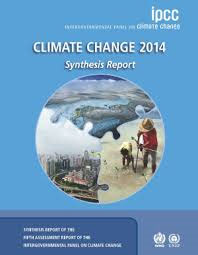While we mentioned the IPCC’s final climate report earlier this week, we’d be remiss if we didn’t provide you with more details about it.
The Climate Change 2014 Synthesis Report summarizes the three reports the Intergovernmental Panel on Climate Change (IPCC) issued over the past two years and contains even sterner warnings – if that’s possible.
Keep in mind that, as in every report the IPCC has issued, scientists err on the conservative side. Many of the extreme weather events we’re seeing today were first predicted to begin in the second half of this century. 800 scientists from across the world contributed to this most comprehensive assessment of climate change ever.
The upshot is, the extreme weather events we’ve been seeing are nothing – they will get unimaginably worse unless the world responds much more aggressively NOW.

Let’s start with their blockbuster statement:
Because there must be an absolute limit on cumulative greenhouse gas emissions in the atmosphere (to support life on earth), the use of fossil fuels must be significantly scaled back in the coming decades, and eliminated entirely by 2100 (unless all carbon is captured).
This is the result of the world waiting so long to take action. The more we pump into the atmosphere, the less room there is for more.
"We have little time before the window of opportunity to stay within 2ºC of warming closes," states Rajendra Pachauri, Chair of the IPCC.
"To keep a good chance of staying below the 2C, and at manageable costs, our emissions should drop 40-70% globally by 2050, and fall to zero or below by 2100."
At the same time, renewable energy must grow from 30% now (including to hydro) to 80% by 2050.
If greenhouse gas emissions simply continue as they are now, we are "increasing the likelihood of widespread and profound impacts affecting all levels of society and the natural world."
"We have the opportunity, and the choice is in our hands. The solutions are many and allow for continued economic and human development. All we need is the will to change."
At this point, halting emissions isn’t enough, we must also take strong adaptation measures to deal with what’s already baked into the climate system, they say. The longer this takes, the more it will cost.
But We Can Still Turn This Into An Opportunity
Yes, this is frightening, there’s no doubt about it, and while getting to zero emissions may seem impossible, we need to see it as the opportunity that it is.
"Phasing out fossil fuels is about different investment opportunities: the IPCC estimates that annual investment in low-carbon electricity will increase by $147 billion and investment for energy efficiency in transport, industry and buildings by $336 billion compared to a business-as-usual scenario from 2010-2029. Zero emissions do not imply zero growth," says Sean Kidney, President of Climate Bonds.
And these technologies are now much more affordable now, with solar and wind able to compete on price with fossil fuels.
"What we need to fund is essentially a shift to green (climate-smart)
infrastructure. The good news is that infrastructure investment is nothing
new, and while the massive scale and speed of change required is unprecedented, the
tools and instruments are well-known and well-proven; from regulation to floor
pricing and partial guarantees. All policy makers need to do is pull them
out of the bottom drawer and put them to work for the climate," says Kidney.
Unfortunately, that step is the hardest, because every action is a drag-out fight with Republicans, who are now taking over Congress.
"In the starkest terms ever used, the scientific community is looking world leaders directly in the eye and demanding
they wake up. To fight global poverty, sustain stable governments and societies, and maintain a livable planet, all findings indicate that we should kick fossil fuels to the curb. The silver lining to the report is that it recognizes clean energy climate solutions are affordable and ready to deploy," says Michael Brune, Executive Director of Sierra Club.
"We do not need any more reports – we need action. We don’t have any more time to coddle fossil fuel billionaires or politicians who will eschew responsibility at every corner. That’s what the
400,000 people who marched in September demanded and that is what the scientific community is again confirming. The stakes for negotiations in Lima and Paris are now obvious, and the table is set for world leaders to take significant, immediate action to avert catastrophe."
Read our articles on the three reports issued in 2013-2014:
IPCC Releases Climate Research Update: Warming is Unequivocal
IPCC Update Emphasizes Series of Multiplying Risks
3rd Installment of IPCC Report: We CAN Do It If We Act NOW
Here’s the Synthesis report:

